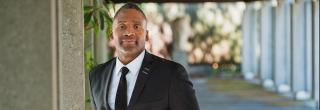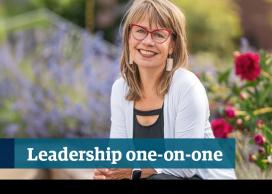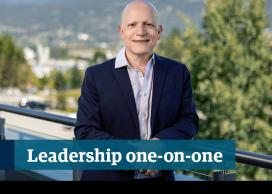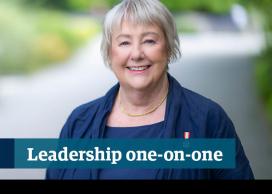Ainsley Carry came to UBC in April 2019, charged with leading the VP, Students portfolio. He brings with him a wealth of experience, having most recently served as the Vice-President for Student Affairs at the University of Southern California, and at Auburn University before that.
A passionate advocate for students, Ainsley is on a mission to create an unparalleled experience for students at UBC. He holds a doctorate in education and a master’s degree in counsellor education, both from the University of Florida.
Q1. What quality do you most admire in a leader?
AC: I most admire approachability. Leaders who, when you meet them, make you feel like there are no barriers stopping you from extending your voice and asking them a question.
I also really admire leaders who follow through. If they say they’re going to do something, then they actually do it. It’s something I try to practice in my daily life, and something I feel our organization should do too. We owe an incredible debt to the students who enroll at UBC and the parents who pay tuition fees. I believe we should follow through on the university experience we promise them.
Q2. What makes you laugh?
AC: I like smart, witty comedy. I was a big fan of Seinfeld when it was on TV, and The Office. I like comedians who look at the obvious things that you see every day, but never take any real notice of, and show the humour in them. The thoughtful, insightful comedy that makes you cringe, and even makes you feel like you shouldn’t laugh. I like how this comedy shows us that sometimes, we can take some issues far too seriously.
Q3. Who inspires you, and why?
AC: Barack Obama. He displays the qualities I most admire in a leader: he’s approachable — the kind of guy you can have a beer with. I also believe he genuinely tried to do what he said he would do. He held his team accountable, and in his eight years in office, had no scandals. He is a family man, very thoughtful, strategic and leads with integrity.
I’m also inspired by his story of how he got there… from where he grew up, to how he was raised. It’s a hero’s journey, and one I find deeply inspiring.
There are times when I am trying to figure out how best to approach something, and I think, how would Barack Obama have thought about this?
Q4. For you, what makes UBC different?
AC: I was drawn to the comprehensive, intellectual environment that’s here. UBC’s faculties and academic programs are among the best in the world. In the previous institutions I’ve worked, we were concerned with being the best in the state, in the region, or in the country. Whereas at UBC, we are focused on the global community, and how we can effect change on the world stage.
As an example, if I think of our efforts around sustainability, on climate science, and what we can do to tackle waste in our oceans, we are trying to move the needle for the world — not just the city of Vancouver, or even Canada. It’s ever expanding.
Q5. What’s the most important lesson that you’ve learned in your career so far?
AC: More and more, I grow an appreciation for the power of listening. I often remind myself that I have two ears and one mouth, so I can listen twice as much as I talk.
Previously, I might have attended a meeting and as soon as I had a thought, would be waiting for an opportunity to interject and share it. Now, I just sit back and listen, and inevitably, someone else will say what I was thinking. So, I’ve come to realize that I don’t always have to be the one to say it. There is value in me posing questions and allowing others to have space to provide answers.
I’ve also come to realize — from my wife, daughter and in my professional life — that people don’t appreciate what you know, until they know that you care. So, I am a big fan of listening as a signal that I care.
I have found that the places and the opportunities where I have come in and paused long enough to listen to enough people, is where my work is most appreciated, and I think most effective. I’m not making up solutions based on my intuition, but the solutions are borne from ideas coming from other people.
Q6. How do you like to recharge?
AC: I enjoy getting up early (very early!), doing a couple of hours of exercise, having a productive day at work, getting home, reading something, maybe watching the news or listening to a podcast… and trying to get to bed on time so I can wake up early the next day. I find that exercise is my fuel for the entire day.
I also like to recharge on the weekends by getting in the car and exploring somewhere new — to get lost for a little while, settle down in a random coffee shop and people-watch, read a book or watch a movie.
As I get older, I realize I’m more introverted than I thought, and recharging is sometimes just being alone, with my own thoughts or reflections.
Q7. What is the best advice you were ever given?
AC: The best advice I received was, while you’re a broke university student, stay broke and get as much education as you can.
As I was finishing my master’s degree, one of my advisors asked if I had considered staying on to continue studying. I literally gasped. “No more school!” But he made the point that, once you go off and get married, have kids, buy a house, and a car, it’s significantly harder to come back to school, because you have so many other financial obligations. So, while you’re broke, stay on and get it done, and then you have the rest of your life to pay off your debt and get professional experience.
Q8. What do you value in your colleagues?
AC: Trustworthiness. I want to feel like I can trust my colleagues, and know that if they say they will do something, they will follow through. I also value honesty and integrity. I hope my colleagues are honest about what they’re trying to do, and that they’re doing it for the right reasons. And when I think about what those right reasons are, it has to be about our students.
I understand that people will make mistakes, as no one is perfect. I will also make mistakes! Especially as I acclimatize to a new culture, and way of being here in Canada. I may have some American terminology that is isn’t used here. But I hope we can give each other the benefit of doubt in these instances, as long as we’re operating with the right intention.
Q9. What do you hope will be your lasting impact at UBC?
AC: I hope that we will take quantum steps forward in advancing the student experience, so that, by the time I leave, students have a tangible feeling of an unparalleled experience here at UBC.
I believe we can offer a stellar academic experience in the classroom and we should strive for that same caliber of experience outside the classroom as well. In a 24-hour day, students might be in class for 6 or 7 hours. The rest of the time, they’re with us, accessing services, living in residence, walking on campus, dining on campus, or participating in events. If we have great services, great sports, great recreational facilities, great dining facilities, for example, students will leave with incredible memories of their time here. So when considering UBC alongside other great universities in Canada, people can say, “you want a place with a great academic and student experience? That’s UBC”.
Q10. If you could have a super power, what would it be?
AC: To be able to fly. When I was young, and even now, I dream of flying. I’m not sure where I’m going in these dreams, but I love the idea of being able to fly to different places, and also to see the city from a different angle.
The other superpower I think about is time travel. Specifically, being able to go back in time and change some of my decisions, or things that I have said. Even though I know the movies tell you that you shouldn’t go back and interfere with past events or interact with your previous self! The complexity of time travel really intrigues me.
Q11. What role do you see faculty and staff having in the student experience?
AC: I invite all faculty and staff to think about the kind of experience we want our students to have at the university, and be intentional about curating it. That means listening to students about what they want to do, where they’re trying to go, and designing an experience around their interests.
We all play a role in delivering on the student experience. Students may be enrolled in a specific program, but we can’t draw a line between academic affairs and student affairs, because students don’t make that distinction. Students just think about their interactions with UBC as a whole, and if they have a bad experience with a counsellor, with an academic advisor, or a faculty member, they say “I had a bad experience at UBC”. So, I would love for us as faculty and staff, to come to a shared voice around the student experience, both inside and outside of the classroom, and recognize our roles as stewards of that experience. I ask that we go the extra mile in our interactions with students, and provide the kind of experience that we hope our children would have when they’re at university.
Q12. What is your vision for the VP, Students portfolio?
AC: So much good work has already been done by my predecessors Louise Cowin and Brian Sullivan, so I’m not coming in to an organization and starting from scratch. Nor am I coming into an organization that needs to make a big turnaround in direction. I’m coming into an organization where my best contribution will be sustaining the momentum of what is already a really good Students portfolio.
My work must focus on figuring out how we can scale the fantastic experience that pockets of our students are already having, and removing the barriers— whether they be time, resources, or facilities — so that experience is available to the entire student population.
Published: September 1, 2019
Interviewed by: Megan Czerpak, UBC Internal Communications



